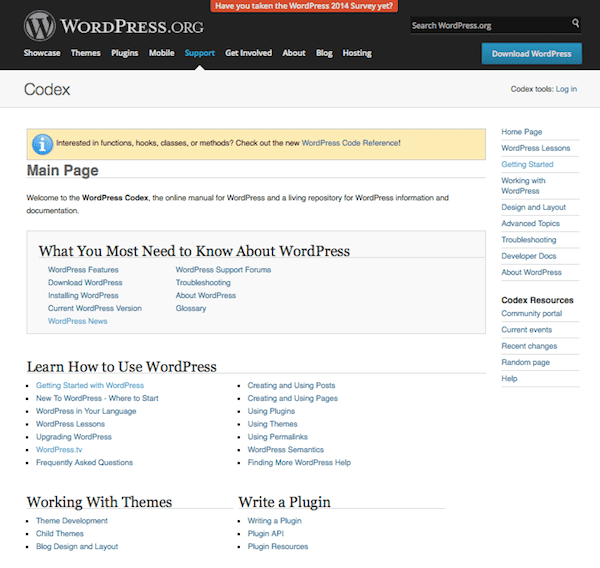When starting any business online, it’s important to be mindful of how people perceive you. Do you come across as professional? Are you viewed as laid back or stodgy? Does your work reflect the high-quality you’re capable of? Do you present yourself as a valued personality on social media?
These are questions you need to think about. Because how people perceive you is the first step toward landing a new client. And if you want to build credibility as a WordPress developer, it’s vital you put in the time to solidify your reputation as a go-to resource now. This isn’t something you can put off until tomorrow.
Building your reputation and credibility are things that should coincide with your entry into the WordPress development field. It should be on your mind as you’re taking on your first client. It is not something to be left as an afterthought.
First Impressions in Business

Image by Vilmos Varga / shutterstock.com
Part of understanding the importance of building credibility might be easier to comprehend if viewed from the context of business in general. You’ve probably heard that first impressions in business are everything. In fact, you only have 7 seconds to make a good impression when meeting somebody new. And online, the time allotment is likely even shorter.
That’s not a lot of time to stand out from the crowd, show you’re an expert in your field, and look good doing it. It’s practically no time at all. On your website and on social media, the first impression you make is going to be less about how you interact in the moment and more about what you’ve done to prepare in advance.
For instance, you’ll want to make sure your social media profiles are filled out completely and that you have a good headshot to use as your profile photo. You’ll want to be mindful of what you say and how you say it. You’ll want to be courteous and professional. Again, this is less about making a good impression on someone you’re directly interacting with right now and more about making a good impression based on your previous actions to that potential client browsing your site or Twitter feed at 2 a.m.
What a Good Rep Can Bring You
Making an effort to build a good reputation yields numerous benefits. Here are just a few:
- You’ll get more clients. Simple enough, right? You put in the work to look credible and more people will be knocking at your door to hire you.
- You’ll build clout in the industry. Nothing like looking like a know-it-all because you actually are one! Build a rep as an expert and you’ll get to flaunt that fact proudly.
- You’ll give off an appearance of authority. Being a leader has many perks, from bringing in new clients to seeing an increased number of repeat customers to having your opinion sought after.
- You’ll be sought out for your expertise and opinion. Users and developers alike will contact you for advice and feedback. The more you give back to these folks, the more the fact that you’re legit will be passed around within the community.
- You’ll be invited to contribute to top-ranking industry blogs. If you can string a sentence together, odds are good professional WordPress blogs will seek you out as a contributor. Real deal developers are always in demand for tutorials.
- You’ll build your social following. And with a social following comes social proof. Basically, the more people that follow you on social media, the more it will appear to people coming across you for the first time that you’re a development force to be reckoned with!
Your Step-by-Step Guide for Building Credibility as a WordPress Developer
While there are certainly other ways to build credibility in this industry, the following five steps should be plenty to get you started out on the path toward a solid reputation.
Step 1: Get Educated

You can’t expect to build a reputation as a credible WordPress developer without actually being one. So put in the work! Educate yourself and take advantage of every resource that’s available to you.
Make the WordPress Codex your bible. Consider enrolling in a online training program, many of which you can pursue at your own pace in your own time. A few to consider include:
For more options, you might want to check out our previous post about the top places to learn WordPress online.
Even if you think you know your stuff, never miss an opportunity to further your WordPress education. This is a field that is continually evolving. It literally changes every single day. If you fail to keep up, you’re going to get left behind. And sharing out-of-date info does not an expert make.
Step 2: Build Your Portfolio
This part can suck. I’m not going to lie. You might find yourself doing some work on the cheap to get that first credit in your portfolio. But so long as you don’t make a habit of it, doing a freebie or near freebie can get you the experience you need much faster than if you waited it out for some big-time company to take a chance on a rookie.
The key here is to do a fantastic job. Banging out ten sites in one month only for them to be subpar and not worth including in your portfolio isn’t exactly the best usage of your time. Instead, focus on creating a really great site. One that shows off your skills and what you’re capable of. This is much more likely to net you new clients than a dozen poorly conceived sites.
Remember: potential clients are looking for quality, not quantity.
Step 3: Be Your Own Advocate

Image by gst / shutterstock.com
Don’t be afraid to pound the pavement a bit to get the word out about what you do. If you’re not going to shout from the rooftops, “I am WordPress developer, hear me roar!” no one else will. Believe me. It is up to you to convey your expertise to the world but through your words and actions. Yes, that means you need to have the skill set and the portfolio to backup your claims but if you don’t tell anyone you’re a developer, nobody’s going to know!
You can start to build your reputation by making sure your website and portfolio are good examples of what you can do. Once that’s in place, share it with the world. Here are a few ways you can advocate on your own behalf:
- Engage on social media. Setup accounts if you don’t already have them and start engaging in conversations about WordPress. Ask and answer questions.
- Contact companies to see if they need your services. You can do this on social media, via contact forms, or email. It depends on the prospect but the important thing to keep in mind is that the more people you reach out to, the more likely it is one of them will get back to you. It’s very much so a numbers game, especially at first.
- Don’t be afraid to brag (a little). If you land a new awesome client (and you’re not under NDA) feel free to brag some about it on social media and maybe your blog. It shows you’re proud of your work and your client, first of all, which is bound to make the client in question pretty dang happy, too. Plus, it demonstrates to the world that your services are in demand. A clear schedule isn’t attractive to potential clients but a booked up developer with limited time slots available is highly coveted. Go figure, right?
Basically, getting the word out about you can get you far.
Step 4: Put Your Expertise on Display
Some of this falls under the “be your own advocate” step described above but there’s something specific about demonstrating your expertise that goes beyond personal advocacy. Rather, this step has more to do with how you show you’re a WordPress expert beyond just adding “WordPress expert” to your Twitter bio.
I’ve already talked about how important it is to include examples in your portfolio of your very best work. This shows potential clients that you care about quality and offers a tangible example of what you can do. But you can take that one step further by offering insights into your process as a developer.
There are two primary ways you can do this: on your blog and/or in case studies. Let’s spend some time talking about both approaches here.
Blogging Your Expertise
Not every WordPress developer is a writer. I know this. But even if you lack verbal prowess, that doesn’t mean you can’t share information you’ve learned with the development world! You don’t have to be the OMG-best-writer-in-the-universe to be a good blogger. You just need to be competent. I highly recommend The Yahoo! Style Guide as a good place to brush up on your grammar and to learn some formatting tips for writing on the web.
With that info in mind, you can easily do quick write-ups on your blog that demonstrate your WordPress knowledge. Offer quick tutorials for how to perform certain tasks in WordPress. Or maybe you happened across a major time saver that you think would be helpful to other developers and even users out there. Share it! Taking a little bit of time out of your schedule to devote to blogging can make a world of difference in how you are perceived and received as a developer.
For starters, an active blog means your site is going to be indexed more readily by Google. That means a higher search engine rank. It also means more eyeballs on your content and your portfolio. Having an active blog also gives you something to share on social media. While you should always try to employ the 80/20 rule on social—80% of what you share should be created by others, while just 20% is created by you—writing new posts on a regular basis means you’ll always have something of yours to share.
Using Case Studies
Once you’ve completed a few projects for clients, you can use those experiences to write case studies. Case studies give you the chance to tell the story of your client and her site. It starts with information about the client and her background then moves into what specific problem she was looking to solve with a new or renovated site. From there, you can discuss how your services acted as the perfect solution to the problem.
The key is to make it interesting and try to maintain a storytelling narrative as much as possible. This might be something you want to outsource. If you’re feeling leery about the expense, think of it this way: case studies give potential clients an opportunity to walk in the shoes of your previous clients. You give them insights into what it’s like to work with you and what benefits your services provide.
As an added bonus, case studies allow you the opportunity to discuss in detail what specifically went into a development project. Don’t be afraid to get technical. Not only will people appreciate you have an eye for detail; they’ll also get a real sense of your credibility as a WordPress developer. At every turn, you should be giving potential clients something to work with in terms of making a decision about you and your skills.
Step 5: Pay It Forward

Image by BoBaa22 / shutterstock.com
To put the icing on the proverbial reputation cake, you need to do your part to contribute to the WordPress community. If you want to appear as an expert and as someone people would actually want to work with, giving back in some way is an incredibly valuable way to make your mark.
This can be doing something as simple as always answering questions when people email you or message you on social media or as time-intensive as being a budding developer’s mentor. Let’s look at a few ways you can “pay it forward” as a developer.
- Be available. This is probably the easiest thing you can do that has the potential to make the greatest impact on your credibility. Simply, make yourself available to people who want to ask questions of you or who would like your guidance. So, if someone leaves a comment on your latest blog post, take the time to respond. If you get mentioned on Twitter, respond. If someone emails you to ask about how to get started as a developer, answer. Yes, this will take some of your time to do, but you walk away having done the right thing and having put in the effort to build your reputation as a developer.
- Be a mentor. While you can actively seek out opportunities to be a mentor, often they will fall right into your lap. As you start to build a reputation for yourself as a developer to pay attention to, more and more young developers will reach out to you for advice and help. When you come across someone whom you think has great potential, you can take him under your wing and offer guidance. Your time as a developer has taught you a thing or two about the act of developing WordPress sites and the process of running a business, right? So, y ou can offer assistance in both areas to those who seem eager to learn.
- Be a contributor. Another way to improve your credibility and build your reputation is to actively contribute to the WordPress community. Often, this means directly contributing to the development of WordPress itself. There are a number of ways you can get involved. I suggest going to Make WordPress and explore the various areas of development. If your development skills are up to snuff, you can make your mark on WordPress proper and build a solid rep in the process.
If you sit down and really think about it, I bet you can come up with a bunch of other ideas for giving back to the WordPress community.
Wrapping Up
When someone recognizes your name on a blog post or on social media, you want their connotations to be positive. You want people to associate your name with good things. And above all else, you want people to think of you as a reliable and high-quality developer who really knows her stuff.
That’s what building a good reputation is all about. As in every industry, credibility is everything. The question is, have you put in the work to be the best developer you can be?
How are you making a name for yourself as a developer? Do you do any of things I’ve outlined here or are you pursuing a different path toward credibility? Regardless, I’d love to hear your personal story in the comments!
Article thumbnail image by PureSolution / shutterstock.com









Great post.
Thanks for sharing this post.
Sound advice, though I would also add a great way to get involved in the community is to attend WordCamps or even better speak at them.
Good point, Patrick!
Great Article
Gooood, Building your reputation and credibility are things that should coincide with your entry into the WordPress development field.
Thanks
Building your reputation and credibility are things that should coincide with your entry into the WordPress development field. It should be on your mind as you’re taking on your first client. It is not something to be left as an afterthought.
Good
Great article. Good sound advice for those that are young in their business. As a wordpress developer, it is easy to focus on clients and not take care of good marketing for your company. We all have to learn to do the same for ourselves as we do for our clients.
Thanks, Myra. When first setting out, it can be hard to prioritize marketing but it’s so very important. Separates the true pros from the rest of the pack!
Another timely post! Thanks! Just what I needed to help me through my start-up. As always you give lots of detailed information. I need to do more of all of this.
Spot on! Great blog post with wonderful recommendations for any web developer, designer and DIY business owners. We especially liked the part about writing about Case Studies. When we finish a project, we blog under our category of “Client Confetti” which helps celebrate the clients work as well as ours.
“Client Confetti” — I really like that! And you’re absolutely right — case studies show off your work *and* the client’s work. A win-win for everyone involved!